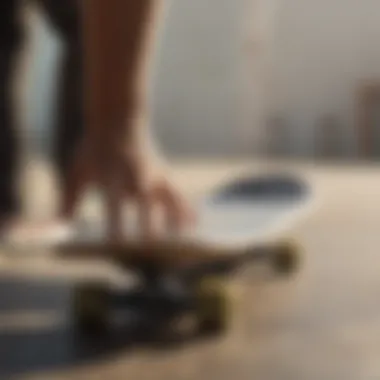Master the Fundamentals: Expert Advice for Novice Skaters


Skateboarding Fundamentals
When stepping into the world of skateboarding, it is crucial to grasp the key basics that will pave the way for your journey as a skater. These fundamental aspects lay the foundation for your progression and enjoyment of this exhilarating sport.
Choosing the Right Skateboard Gear
Selecting the appropriate gear is the initial step towards delving into the realm of skateboarding. The skateboard itself, along with essential safety equipment such as helmets, knee pads, and elbow pads, must align with your skill level and preferences.
Skateboard Components
Understanding the components of a skateboard is essential. From the deck to the trucks and wheels, each part plays a vital role in how your skateboard functions. Familiarizing yourself with these elements will not only enhance your knowledge but also aid in maintenance and customization.
Mastering Basic Techniques
Learning fundamental skateboarding techniques is paramount. Maneuvers like the ollie, kickturns, and riding stance are building blocks for more advanced tricks. Practice and dedication to perfecting these basics will set you on a solid pathway towards becoming a proficient skater.
Skatepark Etiquette
Navigating a skatepark involves more than just skating skills. Understanding skatepark etiquette, such as taking turns, respecting other skaters, and following park rules, contributes to a safe and enjoyable skating environment for everyone.
Safety Precautions
Prioritizing safety is non-negotiable in skateboarding. Wearing protective gear, being mindful of your surroundings, and practicing in suitable environments are crucial safety measures that should not be overlooked, ensuring a secure and injury-free skating experience.
Introduction


Skateboarding, despite its surface simplicity, is a skill-driven sport that demands precision, balance, and dedication. For individuals stepping into the realm of skating, understanding the fundamental basics is akin to laying a solid foundation for future growth and proficiency. This article serves as a guiding compass for novice skaters, offering a treasure trove of insights to navigate the complexities of this exhilarating sport with confidence and competence.
Beginning your skating journey begins with grasping the core principles that underpin this sport. From deciding on the right gear to learning the essential techniques, each aspect contributes significantly to shaping your skating prowess. Embracing these basics not only enhances your proficiency but also fosters a deep appreciation for the craft of skateboarding.
Skaters embarking on this exciting venture must recognize that mastery is a gradual process, with each lesson building upon the last. Delving into topics such as selecting the ideal skateboard and honing proper stance and posture can seem daunting at first, but with diligence and perseverance, even the most challenging maneuvers become second nature.
Moreover, comprehending the essence of skating basics opens doors to a myriad of opportunities for personal growth and skill development. Obtaining a firm grasp of these rudimentary aspects not only boosts your confidence on the board but also instills a sense of accomplishment as you progress along your skating odyssey.
As we unravel the layers of skating fundamentals in the subsequent sections, bear in mind that every lesson learned, every tip absorbed, contributes to your evolution as a skater. Sharpen your focus, steady your stance, and let's embark on this enlightening journey toward mastering the basics of skateboarding.
Understanding Skating Basics
Understanding the fundamental aspects of skating is crucial for beginners diving into this exhilarating sport. In this article, we delve into the essential skills and knowledge that form the foundation of a skater's journey. From the type of skateboard to mastering key techniques, grasping skating basics sets the stage for a successful and enjoyable skating experience. By comprehensively exploring each element of skating basics, individuals can equip themselves with the necessary tools to progress efficiently and confidently in their skateboarding endeavors.
Choosing the Right Skateboard
Selecting the appropriate skateboard is a pivotal first step for any aspiring skater. The skateboard serves as the primary tool for riders, impacting their performance and comfort on the board. Factors such as deck size, wheel hardness, and truck width play a significant role in the overall skating experience. By understanding the importance of choosing the right skateboard, beginners can optimize their skill development and prevent potential issues related to using ill-fitting equipment. It is essential to consider personal preferences, riding style, and intended skateboarding goals when selecting a skateboard to ensure a tailored and efficient skating experience.
Learning Skateboard Anatomy
Acquainting oneself with the anatomy of a skateboard is essential for beginner skaters to comprehend how each component contributes to the board's functionality. Components such as the deck, trucks, wheels, and bearings each play a vital role in the performance and maneuverability of the skateboard. Understanding how these parts work together enhances a skater's ability to maintain and customize their board effectively. By gaining insight into skateboard anatomy, beginners can make informed decisions regarding maintenance, upgrades, and compatibility with their riding style, fostering a deeper connection with their equipment and improving overall skating performance.
Mastering Proper Stance and Posture
Achieving a proper stance and posture is fundamental for beginner skaters to establish a stable and balanced foundation on the board. Proper stance not only contributes to overall comfort and control but also prevents injuries and facilitates skill progression. By mastering correct body positioning, weight distribution, and foot placement, skaters can enhance their stability, maneuverability, and confidence while riding. Developing good posture habits early on aids in the acquisition of advanced techniques and ensures a safe and enjoyable skating experience. Emphasizing the importance of proper stance and posture sets the stage for skill mastery and long-term proficiency in skateboarding.
Essential Gear for Beginner Skaters


As a novice in the world of skating, understanding the significance of essential gear is paramount. The right gear not only enhances performance but also ensures safety on the board, making it a crucial aspect of your skating journey. When it comes to essential gear for beginner skaters, there are specific elements that can make a significant difference in your experience. Selecting the correct gear can elevate your skills and comfort level while preventing injuries that may deter your progress.
Choosing the Right Shoes
Choosing the appropriate shoes for skateboarding is more than just a fashion statement; it's a practical necessity. Skate shoes are specially designed to withstand the rigors of skating, offering features such as durable soles, enhanced grip, and reinforced areas that endure the abrasion from board contact. Opting for shoes designed specifically for skating can provide better board feel, control, and stability, ultimately improving your performance and responsiveness while cruising or attempting tricks.
Understanding Protective Gear
Safety should always be a top priority when engaging in any sport, especially skateboarding. Protective gear serves as a vital shield against potential injuries, shielding your body from impacts and falls. Understanding the different types of protective gear available, such as helmets, knee pads, elbow pads, and wrist guards, is crucial for ensuring a safe and enjoyable skating experience. Investing in quality protective gear not only reduces the risk of injuries but also boosts confidence, allowing you to explore new skills and tricks with peace of mind.
Basic Skating Techniques
Skating is an art that requires mastering various techniques to glide smoothly and confidently. In this section, we delve into the significance of basic skating techniques within the realm of skating fundamentals. An understanding of these techniques is crucial for beginners as they lay the foundation for more advanced maneuvers. By covering essential elements like maintaining balance, shifting weight, and proper foot placement, beginners can develop a strong skill set that will aid them in their skating journey. Emphasizing basic skating techniques not only promotes stability and control on the board but also ensures safety while performing tricks and maneuvers.
Getting Comfortable on the Board
Getting comfortable on the board is a pivotal first step for beginner skaters to build confidence and familiarity with their skateboard. It involves finding the right balance, adjusting foot positioning, and understanding weight distribution. Beginners should practice standing on the board, shifting their weight back and forth, and gaining a sense of stability. Developing comfort on the board sets the groundwork for mastering more complex skills and maneuvers, making it essential for beginners to dedicate time to this fundamental aspect of skating.
Practicing Pushing and Braking
Mastering the techniques of pushing and braking is essential for beginner skaters to maneuver efficiently and safely. Pushing involves propelling the skateboard forward using one foot while maintaining balance, whereas braking requires controlled pressure on the board to slow down or come to a halt. Beginners must practice pushing off smoothly, gaining momentum, and braking gradually to navigate their surroundings effectively. Understanding and honing these core skills contributes to a skater's overall control and confidence while on the board.
Learning to Turn Safely
Learning to turn safely is a critical skill for beginner skaters to navigate corners and change directions with ease. Proper turning technique involves shifting body weight, carving smoothly, and using controlled motions to execute turns. Beginners should practice turning on flat surfaces before progressing to inclines or curves to build proficiency and confidence. Mastering safe turning not only enhances agility on the board but also minimizes the risk of falls or accidents while skating.


Exploring Basic Tricks
Exploring basic tricks introduces beginner skaters to the exciting world of skateboarding maneuvers beyond the fundamentals. From ollies to kickturns, basic tricks allow beginners to showcase their skills and express creativity on the board. Understanding the mechanics of each trick, practicing consistently, and seeking guidance from experienced skaters are key steps in mastering basic tricks effectively. As beginners progress in their skating journey, exploring basic tricks serves as a stepping stone towards more advanced and intricate maneuvers, fostering passion and dedication for the sport.
Safety Tips for Beginner Skaters
As a beginner skater, focusing on safety is paramount to enjoy and progress in the sport effectively. Safety tips not only protect you from injuries but also build a strong foundation for learning and advancement. One crucial element of safety tips for beginner skaters is the emphasis on wearing protective gear consistently. From helmets to knee and elbow pads, wearing the appropriate protective gear at all times significantly reduces the risk of potential injuries. Moreover, it instills a sense of responsibility and mindfulness towards personal well-being while engaging in skateboarding activities.
Wearing Protective Gear at All Times
When delving into the specifics of wearing protective gear as a beginner skater, it's essential to pay close attention to the quality and fit of each gear piece. Helmets should snugly fit your head without impeding vision or movement, offering optimal protection in the event of a fall. Knee and elbow pads should be durable and cushioned to absorb shocks and mitigate the impact on joints. Wrist guards are also critical in protecting your wrists from sprains or fractures during falls. Investing in high-quality protective gear ensures a safe and comfortable skating experience, allowing you to focus on improving your skills with peace of mind.
Choosing Safe Practice Locations
Selecting safe practice locations is another vital aspect of safety tips for beginner skaters. Ideal practice spots should have smooth and even surfaces, free from debris or obstacles that may cause accidents. Skate parks, designated skateboarding areas, or empty parking lots with few obstructions are ideal choices for beginners to hone their skills. Avoiding crowded or high-traffic areas is crucial to minimize the risk of collisions with pedestrians or vehicles. By choosing safe and suitable practice locations, beginner skaters can enhance their learning experience and build confidence in navigating different terrains.
Being Mindful of Surroundings
In the realm of skateboarding, being mindful of your surroundings plays a pivotal role in ensuring your safety and the safety of others. Always be aware of pedestrians, cyclists, or fellow skaters sharing the space with you and adjust your speed and maneuvers accordingly. Practicing situational awareness helps you anticipate and avoid potential hazards, such as sudden obstacles or uneven surfaces. Additionally, respecting local regulations and guidelines regarding skateboarding areas demonstrates good sportsmanship and a commitment to safe skateboarding practices. By being mindful of your surroundings and proactively adapting to changing environments, beginner skaters can cultivate a safe and positive skating experience while contributing to the overall well-being of the skating community.
Developing Skills and Progressing
In the realm of beginner skaters, the journey of mastering the basics and advancing in skill level is a vital component. Aspiring skaters delve into this segment with eagerness and determination, recognizing that progressing in skill is the key to unlocking a repertoire of impressive moves and techniques. Developing Skills and Progressing acts as the foundation upon which a skater's proficiency is built, emphasizing the significance of constant improvement and evolution.
Amidst the vast expanse of skating knowledge, the section on Developing Skills and Progressing stands out as a beacon of guidance and motivation. Its essence lies in the continuous refinement of one's abilities and the commitment to honing skills over time. From perfecting basic maneuvers to mastering intricate tricks, this segment encapsulates the essence of growth and development in the skating domain.
Delving deeper, skaters are urged to embrace the journey of self-improvement with open arms. Striving for excellence through Consistent Practice and Dedication is paramount. Regular practice sessions not only enhance muscle memory and balance but also instill a sense of discipline and perseverance in individuals. Dedication, coupled with unwavering focus, paves the way for skaters to elevate their performance levels and conquer new challenges.
Moreover, Setting Achievable Goals acts as a roadmap for skaters, outlining clear objectives and milestones to strive towards. By breaking down larger aspirations into manageable tasks, skaters can track their progress and celebrate incremental achievements. Setting realistic goals fosters a sense of accomplishment and fuels motivation, propelling individuals forward on their skating journey.
Equally important is the concept of Seeking Guidance from Experienced Skaters. By leveraging the wisdom and expertise of seasoned practitioners, novice skaters can glean invaluable insights and tips. Mentors provide invaluable advice on technique refinement, risk management, and overall skill enhancement. This exchange of knowledge fosters a sense of community within the skating sphere, where skill-sharing and support are integral components of growth and progression.
In essence, Developing Skills and Progressing serves as a cornerstone in the trajectory of a beginner skater, marking the transition from novice to adept practitioner. Through Consistent Practice and Dedication, Setting Achievable Goals, and Seeking Guidance from Experienced Skaters, individuals embark on a transformative journey of skill enhancement and personal growth within the dynamic realm of skating.







